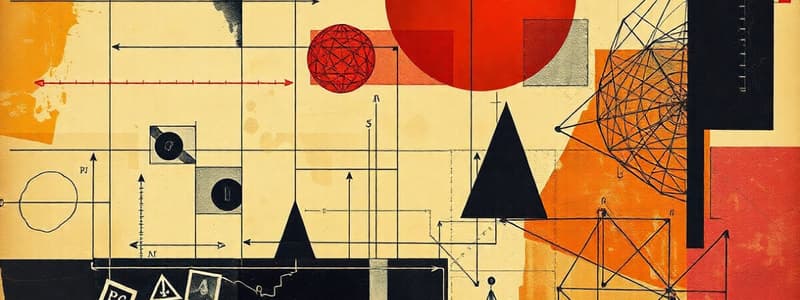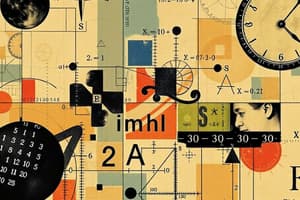Podcast
Questions and Answers
Qual das seguintes opções descreve corretamente a principal função do cálculo?
Qual das seguintes opções descreve corretamente a principal função do cálculo?
- Estudar as propriedades dos números inteiros e suas relações.
- Explorar as formas, tamanhos e posições de objetos no espaço.
- Representar quantidades desconhecidas e resolver equações.
- Analisar a taxa de variação e o acúmulo de quantidades em processos contínuos. (correct)
Qual das seguintes áreas da matemática é mais focada no estudo de variáveis, equações e funções?
Qual das seguintes áreas da matemática é mais focada no estudo de variáveis, equações e funções?
- Álgebra. (correct)
- Cálculo.
- Aritmética.
- Geometria.
Qual conceito é fundamental para a aritmética, servindo de base para operações mais complexas?
Qual conceito é fundamental para a aritmética, servindo de base para operações mais complexas?
- Geometria Não-Euclidiana.
- Derivação.
- Valor Posicional. (correct)
- Números Primos.
Qual ramo da matemática explora tanto espaços bidimensionais quanto tridimensionais, seguindo um conjunto específico de axiomas?
Qual ramo da matemática explora tanto espaços bidimensionais quanto tridimensionais, seguindo um conjunto específico de axiomas?
Qual das seguintes áreas da matemática se concentra no estudo de números inteiros, divisibilidade e números primos?
Qual das seguintes áreas da matemática se concentra no estudo de números inteiros, divisibilidade e números primos?
Qual das seguintes áreas da matemática é fundamental para a criptografia e diversas aplicações matemáticas?
Qual das seguintes áreas da matemática é fundamental para a criptografia e diversas aplicações matemáticas?
Qual é o principal papel da lógica na matemática?
Qual é o principal papel da lógica na matemática?
Qual dos seguintes conceitos não é central na teoria dos conjuntos?
Qual dos seguintes conceitos não é central na teoria dos conjuntos?
Qual área da matemática lida com estruturas e objetos finitos ou contáveis?
Qual área da matemática lida com estruturas e objetos finitos ou contáveis?
Qual é o significado de construir demonstrações matemáticas?
Qual é o significado de construir demonstrações matemáticas?
Flashcards
Números primos
Números primos
Números que só são divisíveis por 1 e eles mesmos.
Lógica matemática
Lógica matemática
Ramo da matemática que usa raciocínio para estabelecer verdades.
Teorema Fundamental da Aritmética
Teorema Fundamental da Aritmética
Todo número inteiro maior que 1 pode ser escrito como produto de primos.
Teoria dos conjuntos
Teoria dos conjuntos
Signup and view all the flashcards
Matemática discreta
Matemática discreta
Signup and view all the flashcards
Aritmética
Aritmética
Signup and view all the flashcards
Álgebra
Álgebra
Signup and view all the flashcards
Geometria
Geometria
Signup and view all the flashcards
Cálculo
Cálculo
Signup and view all the flashcards
Teoria dos Números
Teoria dos Números
Signup and view all the flashcards
Study Notes
Foundations of Mathematics
- Mathematics is a fundamental field of study that deals with abstract concepts like quantity, structure, space, and change.
- It uses symbolic language, logical reasoning, and rigorous proofs to establish and explore relationships between these concepts.
- Key branches of mathematics include arithmetic, algebra, geometry, calculus, and number theory.
Arithmetic
- Arithmetic is the study of basic operations on numbers, including addition, subtraction, multiplication, and division.
- It forms the foundation for more advanced mathematical concepts.
- Fundamental properties like the commutative, associative, and distributive laws are crucial in arithmetic.
- Understanding place value and different number systems (e.g., decimal, binary) is essential.
Algebra
- Algebra extends arithmetic by introducing variables and equations.
- It allows for representing unknown quantities and solving for them.
- Fundamental algebraic structures include polynomials, equations, inequalities, and functions.
- Techniques like factoring, expanding, and solving equations are crucial in algebraic manipulations.
- Applications of algebra are found in various fields, like physics, engineering, and computer science.
Geometry
- Geometry deals with shapes, sizes, and positions of objects in space.
- It explores concepts like points, lines, angles, curves, surfaces, and solids.
- Euclidean geometry, a cornerstone of geometry, describes the properties of shapes in two and three-dimensional space following specific axioms.
- Non-Euclidean geometries explore alternative spaces where these axioms do not hold, expanding the scope of geometric possibilities.
- Applications of geometry can be seen in architecture, engineering, and computer graphics.
Calculus
- Calculus deals with continuous change and the rate of change.
- It develops concepts like differentiation and integration which are used to model and analyze continuous processes.
- Differentiation helps find the instantaneous rate of change of a function.
- Integration allows for calculating accumulated quantities, areas, volumes, and other quantities.
- Calculus is vital in physics for modeling motion, and in engineering for optimizing designs.
Number Theory
- Number theory focuses on the properties and relationships between numbers, particularly integers.
- It deals with prime numbers, divisibility, modular arithmetic, and more abstract algebraic structures related to numbers.
- Prime numbers play a crucial role in various mathematical and cryptographic applications.
- Fundamental theorems like the fundamental theorem of arithmetic are fundamental in number theory.
Logic and Proofs
- Logic is a key component of mathematics.
- It provides the framework of reasoning and establishing mathematical truths.
- It uses symbolic representations to derive conclusions from given statements using rules of inference.
- Constructing proofs is an important aspect of mathematics, ensuring mathematical statements are rigorously justified.
- Formal logic is essential for ensuring the validity of mathematical arguments and establishing connections between mathematical ideas.
Set Theory
- Set theory is a fundamental area of mathematics that studies sets of objects.
- It provides a formalism for expressing collections of mathematical objects.
- Key concepts like sets, subsets, unions, intersections, and complements are central to set theory.
- Set theory forms a foundation for much of modern mathematics.
Discrete Mathematics
- Discrete mathematics deals with finite or countable structures and objects.
- It includes subjects like graph theory, combinatorics, logic, and number theory as parts of its scope.
- Applications of discrete mathematics include computer science, cryptography, and operations research.
Studying That Suits You
Use AI to generate personalized quizzes and flashcards to suit your learning preferences.




